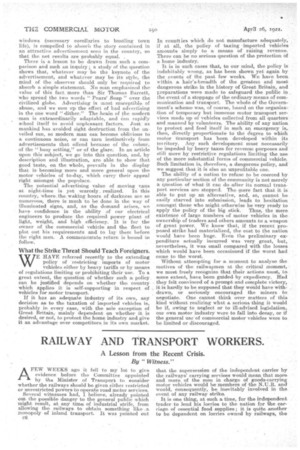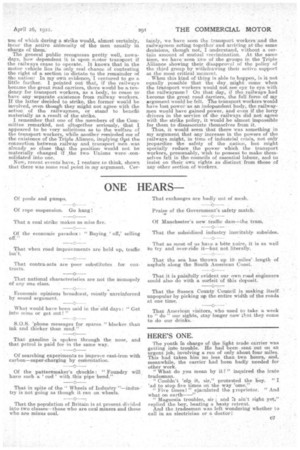RAILWAY AND TRANSPORT WORKERS.
Page 2

Page 3

If you've noticed an error in this article please click here to report it so we can fix it.
A Lesson from the Recent Crisis. By "Witness."
AFEW WEEKS ago it fell to my lot to give evidence before the Committee appointed by the Minister of Transpo0 to consider whether the railways should be given either restricted or unrestricted pewers to operate road motor services.
Several witnesses had, I believe, already pointed out the possible danger to the general public .which might result, at .a.ny time, of industrial strife, from allowing the railways to obtain something like a monopoly of inland transport. It was pointed out 06
that the supersession of the independent carrier by the railways' carrying services would mean that more and more of the men in charge, of goods-earrying motor vehicles would be members of the N.U.B. anti would, consequently, be inevitably involved in the event of any railway strike. It is one thing, at such a time, for the independent trader to lend his lorries to the nation for the carriage of essential food supplies; it is quite another to be dependent on lorries owned by railways, the
use of which during a strike would, almost certainly, incur the ,active animosity of the men usually in • charge of them.
. The general public recognizes pretty well, nowadays, how denendent it is upon motor 'transport if the railways cease to operate. It knows that in the motor vehicle lies its only reel chance of contesting the right of a section to dictate to the remainder of the nation.: In my own ovideraseI ventured to go a little farther. I pointed out that, if the railways became the great road carriers, there would be a tendency for transport workers, as a body, to cease to have any separate existence from railway workers. • If the latter decided to strike, the former would be involved, even though they might not agree with the action of the railwaymen, or stand to benefit materially as a result of the strike.
remember that one of the members of the Committee remarked, not altogether seriously, that I appeared to be very solicitous as to the welfare of the transport workers, while another reminded me of the existence of the Triple Aliance, implying filet the connection between railway and transport men was already so close th.V the position would not be materially changed if ,the two Unions were \consolidated into one.
Now, recent events have, I venture to think, shown that. there was some real point in my argument. Cer tainly, we have 'seen the transport workers andthe rallwa.ymen acting together and arriVing at the same decisions, though not; I -understand, without a certain amount of mutual recrimination. At the same time, we have seen two of the groups in the Triple Alliance showing .their disapproval of the policy of the third group by withdrawing their active support at the' most critical 'moment..
When this kind of thing is able to happen, is it not equally . possible that -the day might come when the transport workers would not see eye to eye with the railwaymen I On that day, if the railways had Lecome the groat road &I:Friers, the full force of my argument would be felt. The transport-workers would have lost power 'as an independent: body, the railwaymen would have gained power, and even if the lorry drivers in the service of the railways did not agree with the strike policy, it would be almost impossible for them to disassociate themselves from it.
Thus, it would seem that there was something in my argument that any increase in the powers of the railways might, in time of industrial crisis, not only jeopardize the safety of the nation, but might specially reduce the power which the transport workers, presumably, wish to possess to make themselves felt in the councils of essential labour, and to insist on their own rights as distinct from those of any other section of workers.
































